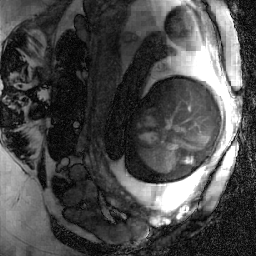Lightweight Deep Models for Dynamic MRI
Spring 2021
Master Semester Project
Project: 00406

Dynamic MRI requires rapid data acquisition for the study of moving organs such as the heart. Existing reconstruction methods suffer from restrictions either in the model design or in the absence of ground-truth data, resulting in low image quality. Recently, we introduced a generalized version of the deep-image-prior approach, which optimizes the network weights to fit a sequence of sparsely acquired dynamic MRI measurements. Our method outperforms the existing state-of-the-art methods, but the model is very heavy and takes a long optimization time. These days, reducing the computations is one of the big issues in the deep learning community not only for an efficient application but for our environment. In this project, we aim to reduce the model size while retaining the performance as much as possible. The student should have solid programming skills, in particular being familiar with PyTorch and a general understanding of the main concepts of deep learning.
- Supervisors
- Jaejun Yoo, jaejun.yoo@epfl.ch, BM 4.141
- Michael Unser, michael.unser@epfl.ch, 021 693 51 75, BM 4.136